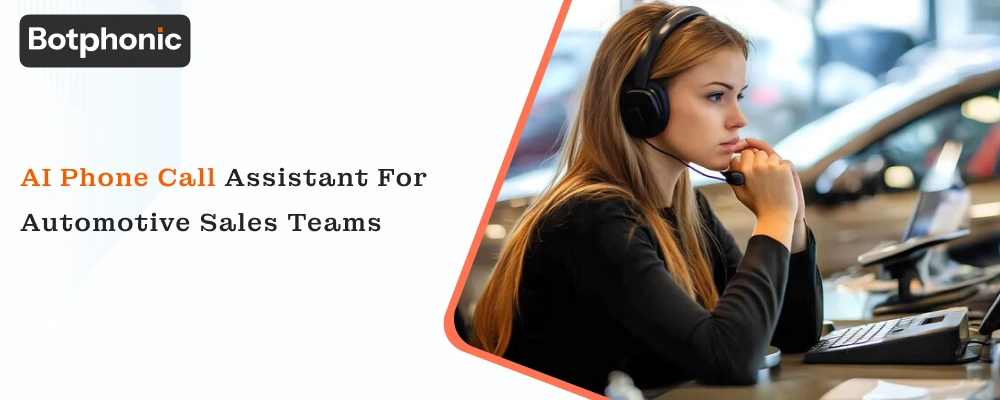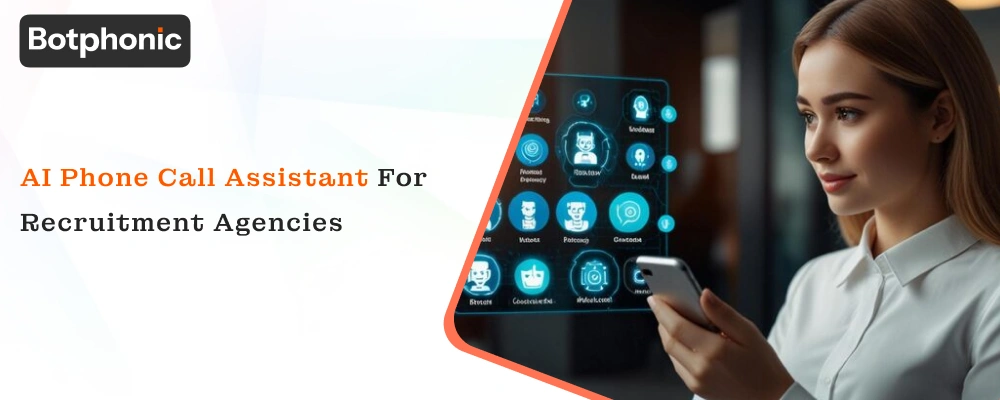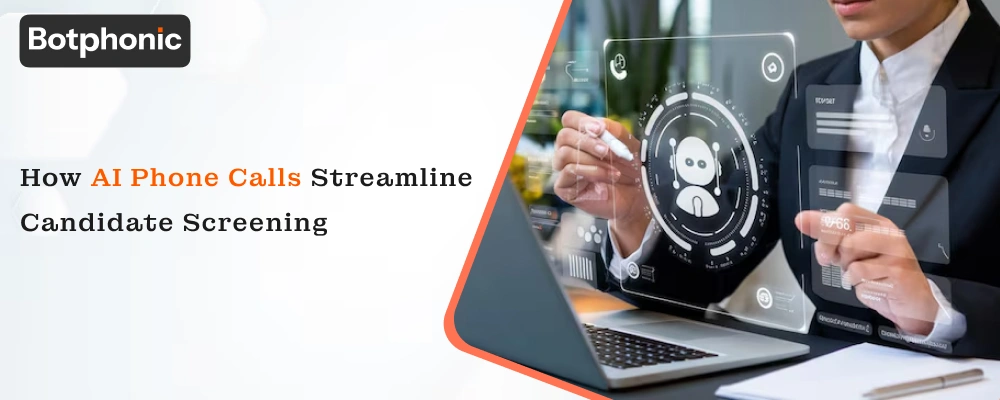
Summarize Content With:
Quick Summary
In this article, we will see how AI phone calls for candidate screening have become the backbone of modern hiring teams. And we’ll explore how an AI phone call assistant for recruiters works behind the scenes.
Introduction
Recruiting talent is a type of battlefield. Filled with ringing phones, spreadsheets that don’t make anyone curious about them, and a never-ending race against the clock. Every talent team out there is claiming they are “moving rapidly,” but let’s be honest, traditional phone screening lengthens the hiring cycle even more. For instance, calls are getting piled up, candidates’ ghosts, and even recruiters burn many hours asking the same qualification questions.
But as other companies are just claiming, there are many who have integrated AI phone call for candidate screening. They are not sci-fi robots that the entertainment industry has promised, but real enterprise-grade technology that’s finally maturing enough to shoulder actual recruiting workloads. Moreover, it’s working consistently, offering speed and reliability that manual processes can’t easily match. The truth is blunt: recruiting workflows built on human-only phone operations are outdated.
Bottlenecks That’re Holding Most Talent Teams Back
Let’s start our work accordingly. Candidate screening isn’t glamorous, but it’s mission-critical. It’s the moment where teams decide who needs to move forward and who isn’t. And yet, the process is penetrated with inefficiencies that everyone knows but aren’t able to talk about it at staff meetings.
1. The Slow Grind of Manual Phone Screening
Recruiters usually spend about 20-40% of their week just making calls to candidates who may or may not even pick up. And when they do, the process usually sounds like a broken record:
- “Can you walk me through your experience with?”
- “What are your expectations?”
- “When can you start?”
- Hold on, let me update that in the ATS…”
It’s repetitive and really slow. Moreover, it’s also inconsistent that’s not exactly going to scale.
2. Data Quality Falls Apart
You can check with any operations leader: garbage in, garbage out. Manual calls usually lead to incomplete notes, subjective impressions, and many times there’s just fragments of ATS data. When hiring managers they might complain about “weak candidates,” the root cause often traces back to inconsistent or missing screening information.
3. The Consequences Nobody Wants to Own
This inefficiency sets off a chain reaction:
- Candidates have to wait for too long just to hear back, and most probably, top talents keep moving on.
- Recruiters get crushed under volume, which leads to rushed judgments and burnout.
- Hiring managers lose trust because pipelines keep drying up.
- Time-to-hire balloons, keeping operations costs way too high.
This is precisely where AI-driven phone calls step in and tell the old ways to take a seat.
How AI Phone Calls Actually Work (Without the Marketing Gloss)
Let’s just skip the technical jargon and get straight to the point. Today’s AI phone call assistant for recruiters is not just a glorified IVR menu. Those were just the clunky systems that banks used in 2008 that never got what you said.
Modern AI phone systems combine:
- LLM-powered natural language processing
- Real-time conversational intelligence
- Intent detection and sentiment signals
- Automated call routing and ETS/ATS integration
To put this simply in practical terms? The AI can easily conduct a full, end-to-end pre-screening call with the candidate that dynamically adjusts questions based on their answers, score outcomes, and updates the system.
The Flow of an AI Screening Call
A typical workflow looks like this:
- Candidate applies for a role.
- Within minutes, the AI phone call for candidate screening triggers a call or SMS opt-in.
- The AI holds a natural conversation, asking job-specific questions.
- Candidate responses are transcribed and interpreted instantly.
- AI generates a scorecard and updates the ATS.
- Qualified candidates get scheduling links or recruiter escalation.
- Recruiters get a clean dashboard; no note-taking, no running around.
No voicemails, missed connections, or “Let me call you back.”
Why Does It Feel So Seamless
The new generation of voice models doesn’t really sound robotic. They pause naturally, clarify the context, detect uncertainty, and handle interruptions autonomously.
And obviously, they do it consistently. Every time.
Why Enterprises Are Adopting AI Phone Calls at Warp Speed
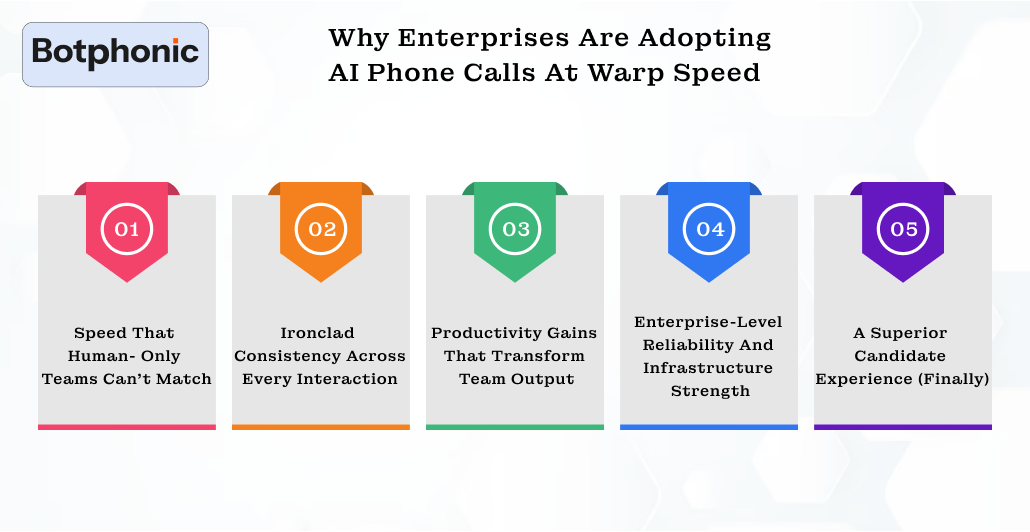
AI-driven phone calls are one of the most preferred tools these days. They have become a competitive weapon and the companies who are moving with this trend rapidly are already getting ahead while everyone is still stuck on “pilot scope.”
Here’s what’s propelling adoption at record speed:
1. Speed That Human-Only Teams Can’t Match
Hiring success has always been more about reaching the candidate first. But you should know AI removes that wait entirely. Even within minutes of application submission, an AI phone call for candidate screening can easily reach out, engage, qualify, and route candidates. There won’t be any backlog, scheduling conflicts, or “I’ll get back to you later.”
Organizations who have deployed AI screening are seeing:
- 40-60% higher candidate engagement rates
- Significant reduction in time-to-first-touch
- More qualified candidates enter the funnel before competitors get them
This is one of the major operational speed turned into strategic advantage.
2. Ironclad Consistency Across Every Interaction
Just ask ten recruiters to run the same screening call and you’’ obviously get ten different versions of the same. Allowing AI to do so helps in eliminating that variability. Every candidate receives the same:
- Questions
- Tone and pacing
- Compliance alignment
- Data capture quality
Consistency isn’t just about efficiency but about fairness, auditability, and brand protection as well. Enterprises value systems that minimize the risk, and FYI, AI does exactly that.
3. Productivity Gains That Transform Team Output
This is where executives perk up. AI call assistant doesn’t just nibble at the edges of productivity. It rewrites the whole equation from the start. An AI phone call assistant for recruiters automates the repetitive task that takes about 40-60% of the day. For instance:
- Screening calls
- Follow-ups
- Clarification questions
- Scheduling prompts
- Availability checks
Recruiters can finally focus on human-centered tasks, such as relationship building, strategic sourcing, and hiring manager partnership.
4. Enterprise-Level Reliability and Infrastructure Strength
When an enterprise deploys AI, they need something much more than just a casual demo. They need stability and a guarantee. They are not looking for side projects but something that makes it feel like a core system.
And it’s one of the main reasons why adoption is accelerating around enterprise AI phone call solutions that offer:
- SLA-backed uptime
- Data governance frameworks
- Encrypted call transcripts
- Multilingual support
- Workflow customization
When talent operations rely on predictability and repeatable processes, AI becomes the trusty partner.
5. A Superior Candidate Experience (Finally)
Candidates are tired of waiting days for simple responses or updates. They are just tired of unclear communication. They are tired of chasing recruiters who aren’t just able to keep up. But with AI, it changes the whole scenario. For instance:
- Immediate response
- Clear and professional interactions
- No scheduling delays
- No back-and-forth email chains
- Faster decision feedback
It makes candidates feel respected and someone who resonates.
Organizations that embrace this shift will obviously run faster and can hire smarter candidates. Moreover, it allows them to operate with the kind of efficiency that the markets are demanding. And everyone else might still be chasing voicemails.
The AI Landscape in 2026: What’s New, What Matters, and What’s Coming
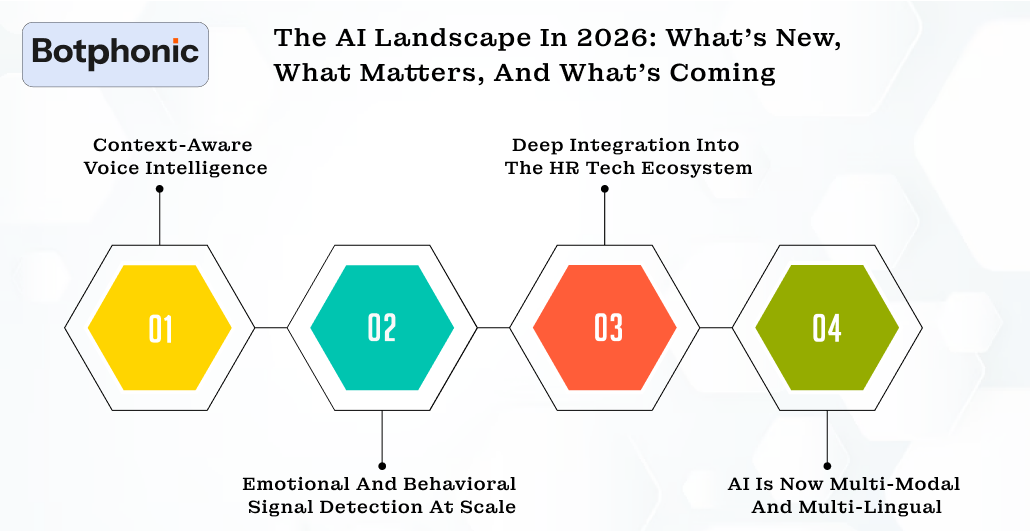
AI in 2026 isn’t just a dream and most importantly, it’s no longer cute chatbots that it was about a decade ago. The landscape has matured significantly; it’s fast and consistent, talent companies that are still stuck on pilot projects are fast behind those aggressive companies that took the risk of deploying it first.
Let’s get straight to the point: AI is no longer an accessory in recruiting but is an infrastructure. Now let’s just get into it and check what’s actually new, what actually matters, and what’s coming.
Here’s what changed:
1. Context-Aware Voice Intelligence
The biggest leap taken forward, now AIcall assistant is finally able to understand context the way a seasoned recruiter needs to. And it’s not just the “read from a script and pray it works” era. Today’s AI:
- Adjusts its questions based on job description
- Recognizes industry terminologies
- Picks up on vague responses and pushes it for clarity
- Tailors follow-ups dynamically
- Handles interruptions, noise, and natural turn-taking
Typically, it performs the same intellectual heavy lifting a recruiter does on a screening call.
2. Emotional and Behavioral Signal Detection at Scale
2026 AI systems don’t work on guessing, but they analyze. They are effectively noticing every little detail, such as:
- Hesitation
- Confidence
- Enthusiasm
- Speech patterns
- Certainty vs. ambiguity
- Inconsistencies in responses
Recruiters have relied on these signals for decades; they work as intangible cues that make the difference between a maybe and a yes. The catch? Humans can’t exactly process that level of nuance across thousands of calls per week.
3. Deep Integration Into the HR Tech Ecosystem
The era of standalone AI tools is long gone. Today’s AI phone call assistant for recruiters plugs into the full talent stack:
- ATS
- Recruiting CRM
- SMS/email systems
- Scheduling platforms
- Workforce analytics
This integration turns AI from a novelty into operational plumbing that’s consistent, reliable, and built for scale. You are no longer just deploying AI but building an ecosystem where AI becomes the base for speed, quality, and consistency across the entire funnel.
4. AI Is Now Multi-Modal and Multi-Lingual
What used to require multiple systems, such as voice, text, email, workflow tools, analytics dashboards, and more. These are now just getting unified in AI engines. Systems can simply:
- Call candidates
- Text reminders
- Email summaries
- Update the ATS
- Score conversations
- Provide recruiter insights
- Function in dozens of languages
And obviously, they can switch modes mid-workflow without even missing a beat.
For global recruiting teams, this is a major shift.
Now that we have discussed what it actually is and what matters, let’s dive into what’s coming.
1. Predictive Candidate Success Scoring Becomes Standard
Those days are long gone when hiring decisions were based on gut feeling or just surface level resumes. In the upcoming years, AI phone call assistant for recruiterswill enable predictive scoring models that combine historical hiring data, performance benchmarks, and real-time conversational signals that help generate an objective probability or a candidate’s success in a role.
2. Voice-Driven Reference Checks
Reference checks have always been a bottleneck, slow and inconsistent, that often relies on goodwill and the willingness of the former manager. AI will transform this process by conducting voice-driven reference calls that are structured, automated, and secure. The system will just verify the identity of the reference, ask consistent competency-based questions, and score responses.
3. Real-Time Fraud Detection During Candidate Calls
Hiring fraud, identity misinterpretation, and resume embellishments are quite the cost that companies pay. AI systems are set to tackle these issues by analyzing live calls for voice mismatches, behavioral anomalies, and inconsistencies with submitted documentation. By running these checks in real-time, recruiters will be alerted instantly to potential risks, reducing exposure to fraudulent hires.
4. Workforce Planning Gets an AI Overhaul
Workforce planning these days is usually reactive, manual, and outdated. In the near future, AI will forecast hiring needs based on business trends, attrition patterns, and skill gaps. It will model scenarios, predict role demand, and will even help by recommending hiring timelines with precision. For CHROs and HR leaders, this means decisions are now proactive and data-driven rather than reactive.
Let Your Team Focus On High-Value Tasks and Automate Repetitive Tasks That Take Up to 50% Of Your Day
Book Your Demo Now!!Conclusion
Manual phone screening is no longer a sustainable strategy. The repetitive, inconsistent, and time-consuming processes that once defined candidate screening are being nudged by AI-driven solutions. Moreover, these solutions are effectively helping to deliver speed, consistency, and scalability. From predictive success scoring and voice-driven reference checks to real-time fraud detection and autonomous workforce planning.
Organizations that are embracing AI phone call assistants effectively gain more than just operational efficiency, but also unlock strategic advantages. As per recent research done by GlobeNewswire, 99% of talent acquisition teams are leveraging AI or automation tools in their whole recruiting process. Recruiters are now freed from repetitive tasks and are able to focus on relationship building and high-value decision-making. Moreover, candidates are also able to experience faster and clearer communication along with measurable improvements.
